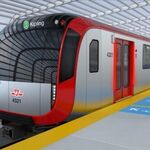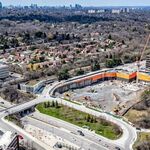As with any project, there's lots of talk about development, and not enough discussion, I think, about the broader transport purpose of a Sheppard Subway.
There's always lots of talk about a crosstown corridor north of downtown, whether that's Midtown GO, or the Ontario Line Loop (which is silly), or the 407 Transitway. Yet those projects leave a hole for medium-to-medium-long distance transit between Bloor and the 407. This is my problem with Eglinton - it's a regional line, but it's also not at the same time. A frankentross, if you will. Anyways ...
Building this line as LRT would be an error. Sheppard is the only transit line we'll have, ever, that fills a relatively high-speed role in this gap (see: 401 traffic), and it also serves/will serve density at the Downsview site and on Sheppard East. We've already shot dead the other opportunity for fast crosstown transit, the kind that makes suburb <-> suburb trips competitive on transit; let's not do it again.
I don't think Sheppard will need six-car TRs with 24,000 PPHD in my lifetime, and I plan to live to a 12-million population GTA. Smaller trains would make lots of sense, but will we do the smart thing and build four-car platforms on the extensions to save costs? Given our track record ... /bleh
Also, LRT conversion on Line 4 Sheppard would have to tunnel east of the 404, at least to Consumers, which also requires a tunnel portal and interface with the existing line. At that point, a Sheppard LRT would be like the Crosstown. It's the worst of both worlds: higher costs, lower capacity, and mediocre speeds. Also, a conversion would have political problems. See below.
I am a staunch believer that we should slightly undersize transit whenever possible.
That way we can run more frequent service and point to full vehicles as proof of high transit demand.
An overcapacity Yonge Line didn't produce the DRL for 30+ years; full buses have failed to produce upgrades across this city.
I wouldn't hold my breath. Lawrence and York Mills/Wilson aren't coming soon; Finch East might happen by 2050, but as a local-oriented LRT.
I agree. However, an extension of the existing subway seems more likely.
Converting to light metro is really beneficial if we think long term, and take into account an eventual extension beyond McCowan in the east, and beyond Dufferin in the west.
If we only look at Phase 1, likely Sheppard West to McCowan, then the additional cost of converting the existing section will not be sufficiently offset by the cheaper new sections.
Nearly every government wants short-term benefits, that help them get re-elected. From that perspective, extending the existing subway is less disruptive/complex than the conversion.
The larger cost wouldn't be the price of conversion, it would be the disruption to riders.
If we shut down Sheppard for the minimum 1-2 years a conversion would take, one can only imagine the media outrage. The outrage would be lacking in substance, but any government wouldn't want that kind of headache.
(minorly edited, because Direction North is a grammar nut)




